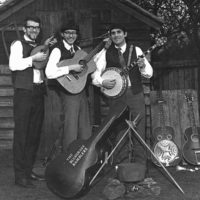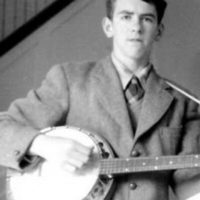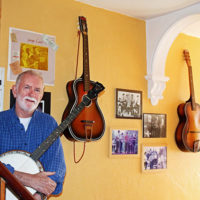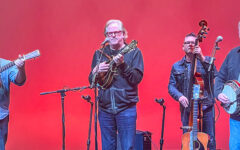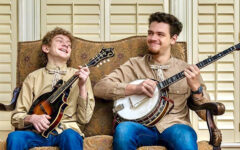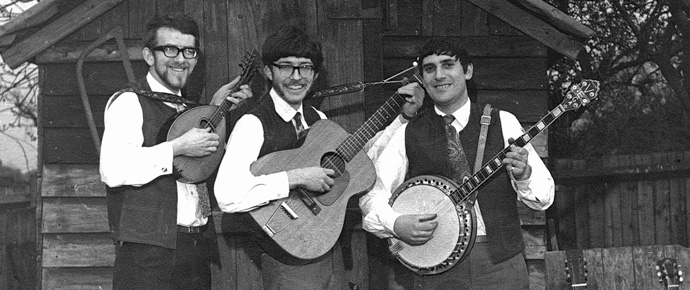
Following an invitation that the International Bluegrass Music Association (IBMA) extended to its members that they share a memory from “75 years of bluegrass”, we thought that we would collect a few to share with you.
Liverpudlian Rod Davis is a contemporary of John Lennon’s, in the same year group going to Quarry Bank School. Both were part of a budding skiffle group that soon became the Quarrymen, the forerunner to The Beatles. As the Quarrymen, along with Davis playing banjo, they had already appeared at The Cavern Club, then veered more towards rock ‘n’ roll music. Rod drifted out of the group after a little over six months. Subsequently, Davis bought and learned to play the guitar and became interested in folk music. Following graduation from Cambridge University, where he was President of the University St. Lawrence Folk-Song Society, he returned to Liverpool and, playing mandolin and fiddle, Davis helped to form The Bluegrass Ramblers.
Since then he has been a guitarist in a Tex-Mex band called the Armadillos, a member of the very successful bluegrass band of the 1980s, reviving the name The Bluegrass Ramblers, and since 1997 has been playing guitar, touring internationally and recording with John Lennon’s Original Quarrymen.
“The original Bluegrass Ramblers were a band from Liverpool founded by banjo player Dave Gould in 1964, with myself on mandolin/fiddle. After several changes of guitarist, by 1967 that spot was filled by Bob Hughes whom we had met through friends from The Wash House folk club which met in the basement of Sampson & Barlow’s, a restaurant near the Empire Theatre. The Wash House was run by Pete McGovern and Billy Moore, two Communist railway workers, although the club was not overtly political. It was subtitled The Singers’ Club because there was a strong policy of getting many floor singers to perform each week. There was a resident group called the Calton Three and Bill and Pete were the MCs and also sang themselves. Pete was an accomplished songwriter and is the author of In My Liverpool Home – now a Merseyside Anthem.
We played all over the North-West, and in 1967 we managed to get on the bill of the Folk Voice bluegrass concert to be held at Islington Town Hall. The concert lasted a whole day, and there were so many groups that you were allowed to play only one number. On the way down to London I was driving the group in Dave Gould’s Citroen DS 19 when we had a blowout in one of the front tires. Thanks to the DS19’s incredible engineering the damaged wheel simply lifted off the ground and we rolled gently to a halt at the side of the motorway. We replaced the tire and set off again, pausing for petrol.
‘Where are you guys off to?’ asked the man in the garage.
‘Londinium,’ said Dave.
‘Well, you’re about two thousand years too late!’ he replied.
When we reached Islington Town Hall, the place was packed with just about every bluegrass group in the country. We finally were allocated a slot for our one number and found ourselves following a bunch of schoolkids from Sevenoaks, the Echo Mountain Band, which consisted of Rick Townend on banjo, his brother Andy on mandolin, Mick Audsley on guitar, and Tim Davies on bass. They were all under 15 years old and were absolutely fantastic, and they received huge applause and we wondered how we could possibly follow such a brilliant performance.
So, we decided to play a silly song called Boil ’em Cabbage Down. This was really an old-timey dance tune with throwaway verses such as:
On the bridge at midnight, my heart was all a-quiver,
I undid her suspender and her leg fell in the river.
Never marry an old man, here’s the reason why,
His chin is all tobacco juice, he never zips his fly.
In between the verses there are frantic fiddle and banjo breaks. This was a huge hit with the audience and they applauded wildly. Afterwards a man in a Hank Williams -style cowboy suit approached and introduced himself as Pat Campbell from Major Minor Records, and he was looking for a follow-up to Seven Drunken Nights with which the Dubliners had recently had a big hit. He thought our Boil ’em Cabbage Down was just what he wanted as a follow-up, in the same humorous vein. He asked us if we had ever thought of trying to get on the Hughie Green Opportunity Knocks show, and we replied, rather contemptuously, that no, we hadn’t, and did not intend to even think of trying.
Nevertheless, Pat said he would contact someone from the show and would be in touch with us, but of course we thought that was just hot air. To our great surprise a few days later we had a call from Milo Lewis, the producer of Opportunity Knocks, who said that they would be in Liverpool that coming weekend to audition for the show, and would we go along. Naturally, we turned up and were appalled by the standard of the other acts who were being auditioned, tap-dancing grannies, etc, so we thought we might actually be in with a chance. Of course, we played Boil ’em Cabbage Down, which had the TV crew literally weeping with laughter and in consequence we were booked to travel to Granada TV studios in Manchester to record the show on 22 July 1967.
We were asked to send in a tape of our song to assist the Director in planning his shots, and I still have the note from Roy Mayoh, the Program Director, which was attached to the bottom of the invitation letter, saying in red type:
N.B. In taping ‘Boil that cabbage down’, would you please try and clean up the verses a bit.’
A few weeks later we drove to Manchester with Pete McGovern from the Wash House, as it was the custom for Hughie Green to talk to a ‘sponsor’ – a friend of the group – while they were changing from one act to another, and we had chosen Pete as he was a good friend of ours and a very amusing talker.
All day we practised the song over and over again as the director planned all the camera shots. It started with a close-up of my fingers on the fiddle as I played the three notes of the introduction. However, we had to change the words in one verse which went as follows:
I bought my girl a pocket watch, she swallowed it one day,
And now she’s taking Epsom Salts to pass the time away.
A gasp of horror went up when this was heard for the first time, and we were told we had to change Epsom Salts to liver salts because we were not allowed to mention an actual product even though it was commercial TV!
Hughie Green himself was not present at the rehearsal, which went on most of the day. Hilarious entertainment however was provided by the Floor Manager, who was standing in for Hughie. He had all his master’s mannerisms off perfectly – ‘Little frog in the throat there, friends,’ so when Hughie did at last appear, we had great difficulty in keeping our faces straight. Our performance went perfectly, no doubt because of the lengthy rehearsals!
However, it was “Death by Clapometer” and we did not win. Opportunity alas did NOT knock, and we heard no more from Major Minor Records, although our fee of twelve guineas for our appearance was most welcome.”
Dave Gould eventually emigrated to Israel where he enjoyed a very successful music career playing bass for a group called The Taverners. He passed away in the late 1990s.
Bob Hughes became an IT wizard, but ended up in the south of France running an organic vegetable farm. He died in 2019.
OK, readers, does this story trigger any thoughts of bluegrass music in days gone by? What related event would you like remembered? Please share in comments. Thanks.

